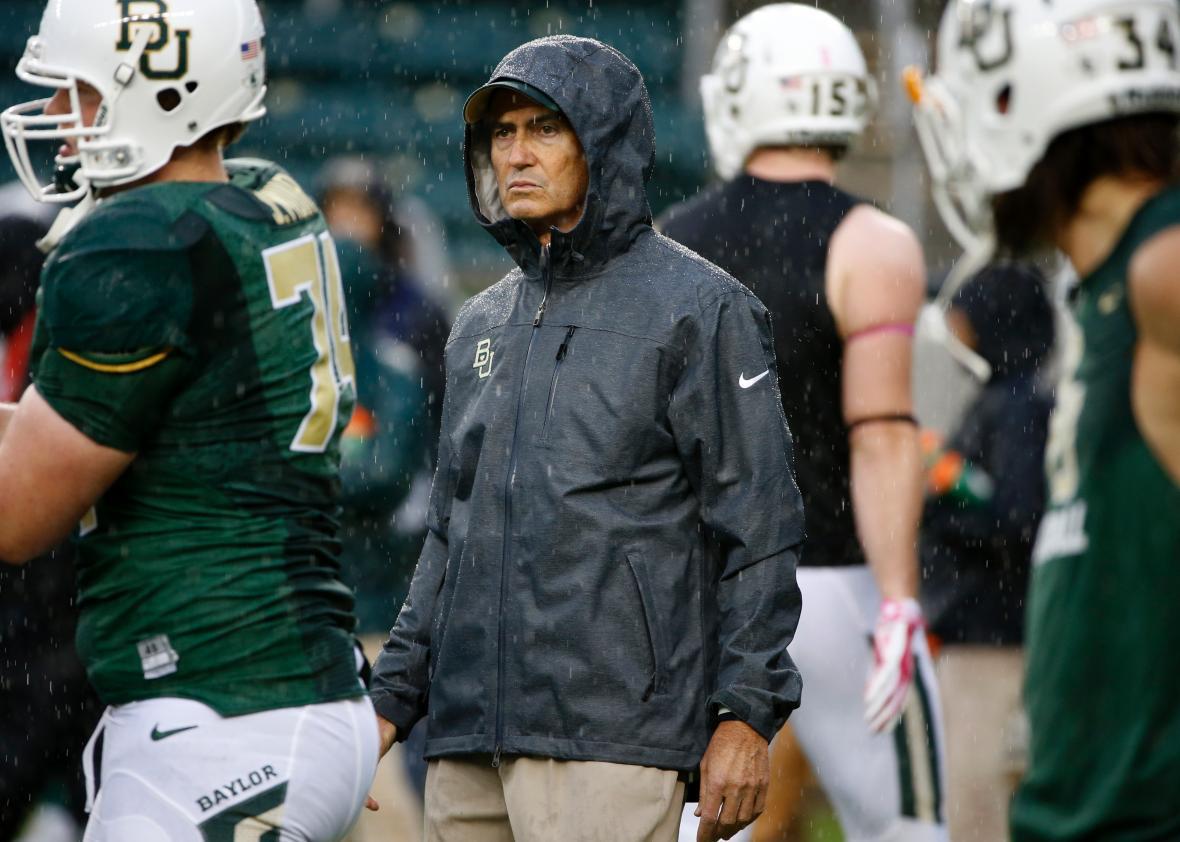In the wake of a recent sexual assault scandal that led to the ouster of its football coach and president, Baylor University is coming under fire for a conduct code that critics say may shame sexual assault victims into silence.
The conservative Baptist school forbids drinking, drug use, and premarital sex; the campus conduct code states that “physical sexual intimacy is to be expressed in the context of marital fidelity.” Chad Dunn, a lawyer representing six women who’ve brought a lawsuit against the university for failing to address their reports of sexual assault, told the Associated Press that the school threatened some of his clients when they came forward with a rape allegation.
“A number of victims were told that if they made a report of rape, their parents would be informed of the details of where they were and what they were doing,” Dunn said.
Two of Dunn’s clients say they were handed alcohol violations when they filed their reports and were made to fear discipline under the school’s sexual conduct policy. Another said she called the police to report an attack on another woman, but the police arrested the caller for drinking and reported her to Baylor’s conduct office. She then reported her own recent rape, which she said had driven her to drink. Baylor, the woman claims, stuck her with an alcohol code violation that carried a community-service sentence but never investigated her rape report.
Baylor’s stringent conduct code was further damned by the report the school commissioned from law firm Pepper Hamilton to assess revelations that school officials had disregarded sexual-assault allegations against at least six football players in the past few years. In May, Pepper Hamilton’s report pushed Baylor to fire its beloved football coach, Art Briles, and demote its president, Kenneth Starr (of Bill Clinton investigation fame), to chancellor. Investigators at the law firm found that Baylor’s conduct policies “created barriers” for survivors who want to report their assaults because they feared “judgmental responses” and disciplinary action from school officials.
Baylor’s interim president, David Garland, told the AP that he is taking the Pepper Hamilton report’s recommendations as “mandates,” and Baylor spokeswoman Tonya Lewis said that the school’s “faith-based” conduct code allows amnesty for drug and alcohol violations when students report sexual assault. That’s great on paper, but it seems that the school’s legislation of morals has stopped short of condemning perpetrators of sexual assault. Several lawsuits now claim that when women accused football players of sexual assault, the school repeatedly declined to investigate the allegations. More than one player ended up being convicted for the crimes the school ignored. Six women allegedly accused one player, Tevin Elliott, of victimizing them, but coach Briles and the school reportedly refused to acknowledge the reports without a court conviction.
At the time of publication, Baylor had not responded to a request for further comment on this story.
The Department of Education’s Office for Civil Rights has noted that conduct-related disciplinary policies can “have a chilling effect on students’ reporting of sexual violence offenses or participating as witnesses.” Baylor is just one of a number of religious universities coming to terms with this reality under heightened scrutiny of campus responses to sexual assault. More than 100,000 students and alumni of Mormon Church-owned Brigham Young University signed a recent petition demanding an immunity clause for students who report sexual assaults after several survivors said they’d been punished for breaking curfew or entering the bedroom of a member of the opposite sex on the night of their assaults.
The petition’s author, Madi Barney, reported to the Provo, Utah, police that she’d been raped by a non-student. Police charged the alleged perpetrator, who admitted to the rape in a recorded phone call with Barney. Barney never even reported the rape to campus authorities—who would have been compelled by federal law to look into the allegation—but BYU officials charged her with violating the school’s honor code, prohibiting her from registering for classes while they investigated her behavior.
Barney’s case provides yet another illustration of how severe, religiously motivated conduct codes can create fertile grounds for retaliation and intimidation of sexual-assault survivors. BYU’s honor code office only found out about her potential violation when Barney’s accused rapist allegedly got a friend in the Utah County sheriff’s department to leak Barney’s report, which included a detailed account of her private medical forensic exam, to the university.
There’s a reason why Title IX requires colleges and universities to take action on sexual assaults independent from the criminal justice system. A criminal case can take years to wrap up; even if it ends in a conviction, the victim may have had to spend her college career alongside her rapist and the perpetrator may have victimized other students in the meantime. Universities can protect their students using a “preponderance of evidence” standard, rather than shrugging at he said–she said accounts that fail to prove a crime “beyond a reasonable doubt” in court. They can give a survivor the timely support she needs to continue her education—counseling, new living arrangements, leniency on class absences—no matter what happens to her alleged rapist. A court cannot.
That’s why any barrier a university erects between a sexual assault survivor and sensitive support is a failure of moral judgment. Sex bans at religious universities shame sexual assault survivors by equating rape with consensual sex: They frame any sexual contact as sinful activity that leaves a permanent stain, amplifying victims’ self-hatred and self-blame, making them less likely to report their assaults or seek justice. Conduct codes like Baylor’s have the doubly unconscionable effect of protecting potential rapists, who know their victims could face disciplinary action if they report the crimes. A school that investigates and punishes drinking and consensual sexual contact more readily than rape is more concerned with its football program and public image than its students’ wellbeing. Where’s the moral high ground in that?
